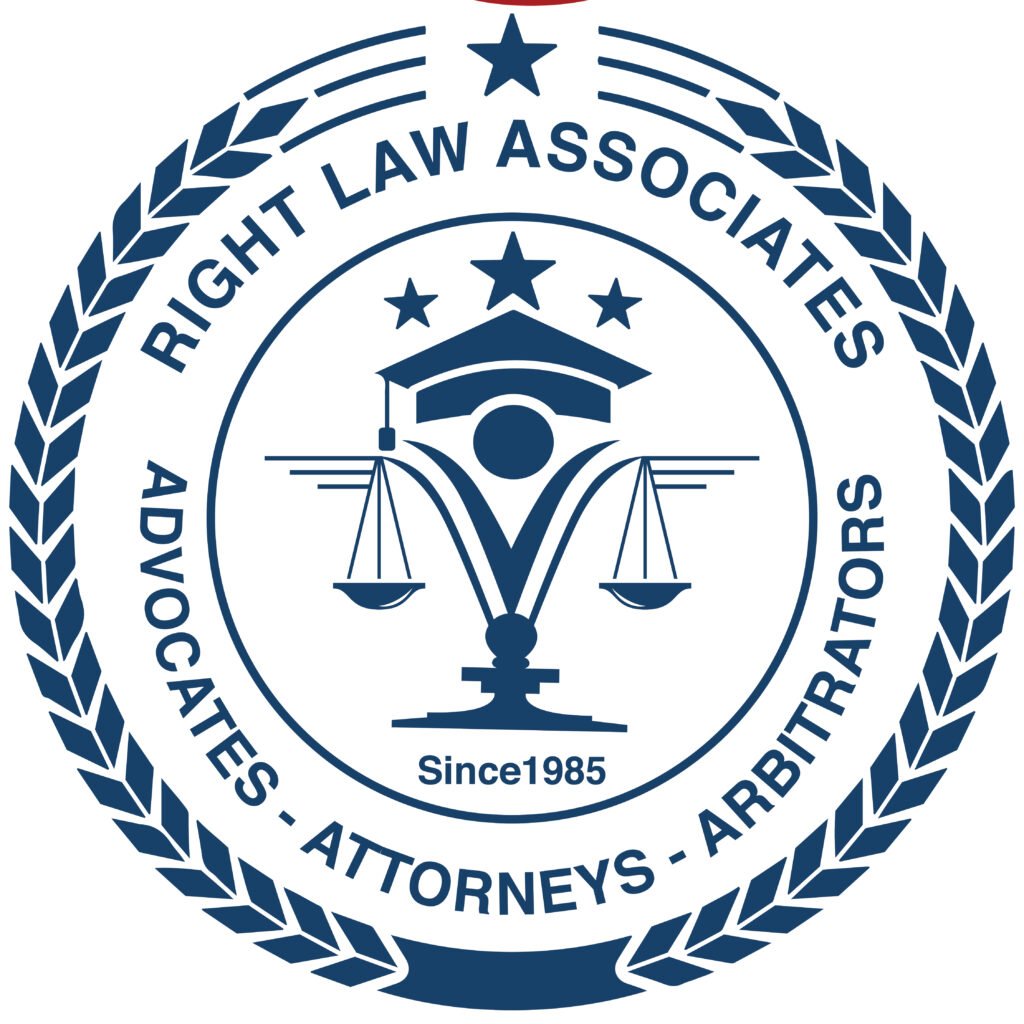Best Child Custody & Guardianship Lawyers in Karachi-Lahore-Islamabad/Rawalpindi, Pakistan
Child Custody & Guardianship Advocates/Lawyers of Right Law Associates: Your Trusted Partner in Child Guardianship Matters in Karachi-Lahore-Islamabad/Rawalpindi-Pakistan
Best Child Custody and Guardianship Advocates/Lawyers in Pakistan
Child custody and guardianship advocates/lawyers at Right Law Associates offer expert legal assistance in resolving complex family matters with compassion and precision. With offices in Karachi, Lahore, Islamabad, and Rawalpindi, we are one of Pakistan’s leading law firms focusing on child custody, guardianship rights, visitation, and parental responsibilities. Whether you’re a mother, father, or appointed guardian, we are committed to protecting the best interests of the child through skilled advocacy and personalized legal solutions.

Trusted Legal Representation in Child Custody and Guardianship Cases
Our experienced family law attorneys provide legal services for:
✅ Child custody disputes during or after divorce
✅ Guardianship appointment under the Guardian & Wards Act, 1890
✅ Visitation rights enforcement
✅ Parental relocation and custody modification cases
✅ Legal guardianship for orphans or incapacitated parents
✅ Assistance in guardianship certificate issuance via family courts
We handle each case with empathy, ensuring that the emotional well-being and future of the child remain our top priority.
Why Choose Right Law Associates for Child Guardianship Matters?
👨⚖️ Over 40 Years of Family Law Expertise
🏛️ In-depth understanding of the Guardian & Wards Act
👨👩👧 Tailored strategies for both contested and mutual custody cases
🛡️ Protection of children’s legal and emotional rights
📍 Services available in Karachi, Lahore, Islamabad, and Rawalpindi
🤝 Compassionate client care and confidential case handling
We work to ensure fair access for both parents and a stable environment for children, using the full extent of the law to enforce court orders, mediate disputes, and protect against parental alienation.
Understanding Legal Guardianship in Pakistan
Legal guardianship refers to the lawful responsibility given to an individual to care for a child, typically under the Guardian and Wards Act, 1890. Our lawyers guide you through:
Filing the guardianship petition
Representing you in family courts
Obtaining the Guardian Certificate
Defending your right in custody battles
Ensuring child welfare assessments are presented effectively in court
We represent both biological parents and relatives and also work with step-parents or third-party guardians where required.
Child Custody After Divorce in Pakistan
In cases of divorce or separation, child custody can become the most emotionally charged issue. Our family lawyers assist you in:
Filing for permanent or interim custody
Applying for visitation schedules
Protecting your rights if the other parent denies access
Modifying existing custody arrangements due to relocation, remarriage, or abuse
We focus on helping you achieve a favorable custody arrangement while minimizing the stress involved in court proceedings.
Cities We Serve
We provide family and child custody legal services in:
📍 Karachi – Muneer Mobile Mall, Jauhar Chaurangi, Block 17, Gulistan-e-Jauhar
📍 Lahore – Chauburji Chowk, Near Surayya Azeem Trust Hospital
📍 Islamabad – G-9, Karachi Company, Mangla Road
📍 Rawalpindi – Rashid Minhas Road
We also offer online consultations and virtual legal advice for clients across Pakistan and abroad.
📞 Contact Right Law for Expert Child Custody & Guardianship Legal Help
If you’re facing a child custody or guardianship issue in Pakistan, don’t navigate it alone. Let the experienced family lawyers at Right Law Associates protect your rights and your child’s future.
📍 Offices in: Karachi | Lahore | Islamabad | Rawalpindi
📞 Call Now: +92 302 66 44 789
🌐 Visit: www.rightlaw.com.pk
📧 Email: info@rightlaw.com.pk
💬 Schedule a Confidential Consultation Today – Because your child’s welfare deserves nothing less than the best legal support.

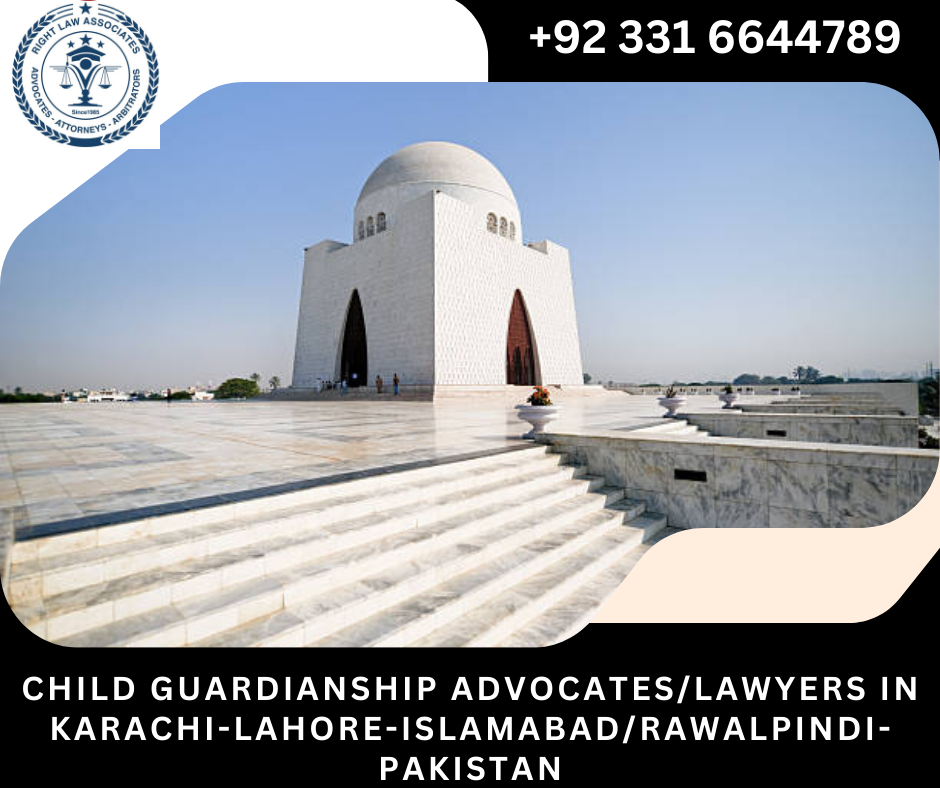
Understanding the Concept of Child Guardianship
Child guardianship is a legal concept that involves appointing a responsible individual or entity to act as the guardian and caretaker of a minor child. This legal arrangement becomes necessary in various circumstances, such as parental incapacity, divorce, or the death of a parent. Understanding the fundamental aspects of child guardianship is crucial for ensuring the well-being and proper upbringing of the child.
Law Governing Child Guardianship
Guardianship of a child is a profound legal responsibility, encompassing various dimensions to ensure the well-being, safety, and proper development of minors. Rooted in a combination of Islamic principles and legislative statutes, notably the Guardians and Wards Act of 1890, the concept of guardianship delineates the roles and responsibilities of individuals entrusted with child care.
Legal Foundations and Types of Guardianship
The legal foundation of guardianship in Pakistan is deeply embedded in both Islamic jurisprudence and statutory laws. Understanding the nuances of guardianship involves recognizing two primary types:
Physical Guardianship (Hizanat)
Physical guardianship entails determining the child’s residence and day-to-day care. This aspect is crucial for providing a stable and nurturing environment.
Legal Guardianship (Wilayat)
Legal guardianship bestows decision-making authority for the child’s upbringing, education, and overall development. This extends to choices affecting the child’s welfare and future.
Paramount Consideration: Child’s Best Interests
At the core of guardianship decisions lies the paramount consideration of the child’s best interests. Courts meticulously weigh factors such as safety, welfare, education, and the child’s overall development. This emphasis on the child’s well-being serves as a guiding principle in guardianship matters.
Looking for Legal Service With Global Quality?
Harmony with Islamic Principles
Guided by Islamic principles, guardianship decisions align with Shariah compliance. This alignment extends to the child’s religious upbringing, education, and moral development. The interplay between legal statutes and Islamic values creates a comprehensive framework for responsible guardianship.
Guardians and Wards Act, 1890: A Legislative Blueprint
The Guardians and Wards Act of 1890 stands as the legislative cornerstone, providing a detailed blueprint for appointing guardians and safeguarding minor children’s welfare. This act empowers courts to make informed decisions regarding guardianship matters, emphasizing the child’s best interests.
Judicial Discretion in Guardianship Matters
Courts exercise discretionary powers when adjudicating guardianship matters. Each case undergoes thorough scrutiny, considering factors such as the guardian’s capability, moral standing, financial capacity, and, most importantly, the child’s welfare. This discretionary approach ensures a nuanced evaluation tailored to each case’s specific circumstances.

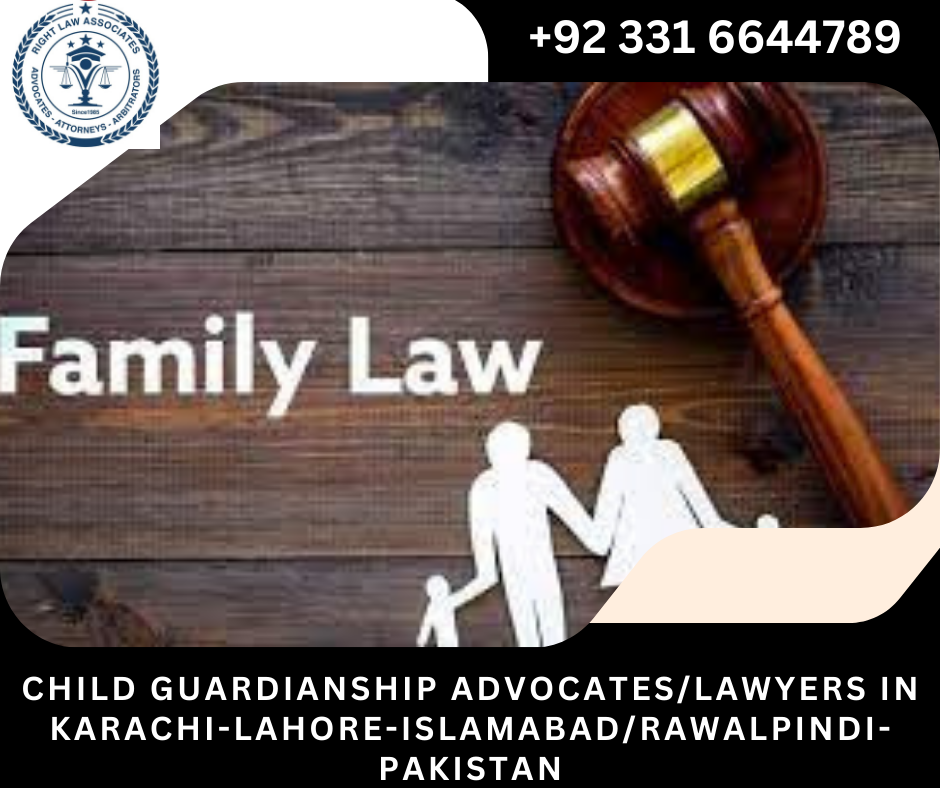
Legal Protocols in Guardianship Disputes
Disputes related to guardianship involve specific legal protocols. These proceedings typically begin with the filing of petitions under the Guardians and Wards Act. Courts play a pivotal role in evaluating evidence, listening to both parties’ arguments, and reaching decisions that align with the child’s best interests.
Advocacy for Mediation and Alternative Dispute Resolution
The legal system actively promotes mediation and alternative dispute resolution mechanisms in guardianship matters. The goal is to foster amicable resolutions, reduce emotional impact—especially for the child—and encourage cooperative arrangements between disputing parties.
The fluidity of Guardianship Orders
Guardianship orders are not rigid but rather adaptable to changing circumstances. Courts may approve modifications prompted by evolving situations or when adjustments align with the child’s best interests. Guardians can petition the court for modifications, ensuring the flexibility needed to cater to the child’s evolving needs.
International Considerations in Guardianship
In an era of increased global mobility, guardianship matters may extend beyond national borders. International aspects of guardianship are addressed under conventions such as The Hague Convention on the Civil Aspects of International Child Abduction. This framework provides a structured approach to resolving cross-border guardianship issues, emphasizing cooperation between nations.
Responsibilities of a Guardian
The responsibilities of a guardian encompass a spectrum of duties aimed at ensuring the child’s holistic development. These include:
Providing a Safe and Nurturing Environment:
Creating a stable and secure living environment for the child’s physical and emotional well-being.
Educational Decisions:
Making decisions regarding the child’s education, including school selection and educational goals.
Healthcare Choices:
Authorizing medical treatments and healthcare decisions for the child’s well-being.
Financial Management:
Managing the financial affairs of the child, including any inheritance or assets.
Moral and Religious Guidance:
Offering moral and religious guidance in alignment with the family’s cultural and religious values.
Legal Advocacy:
Advocating for the child’s legal rights and interests, including representing them in legal proceedings.
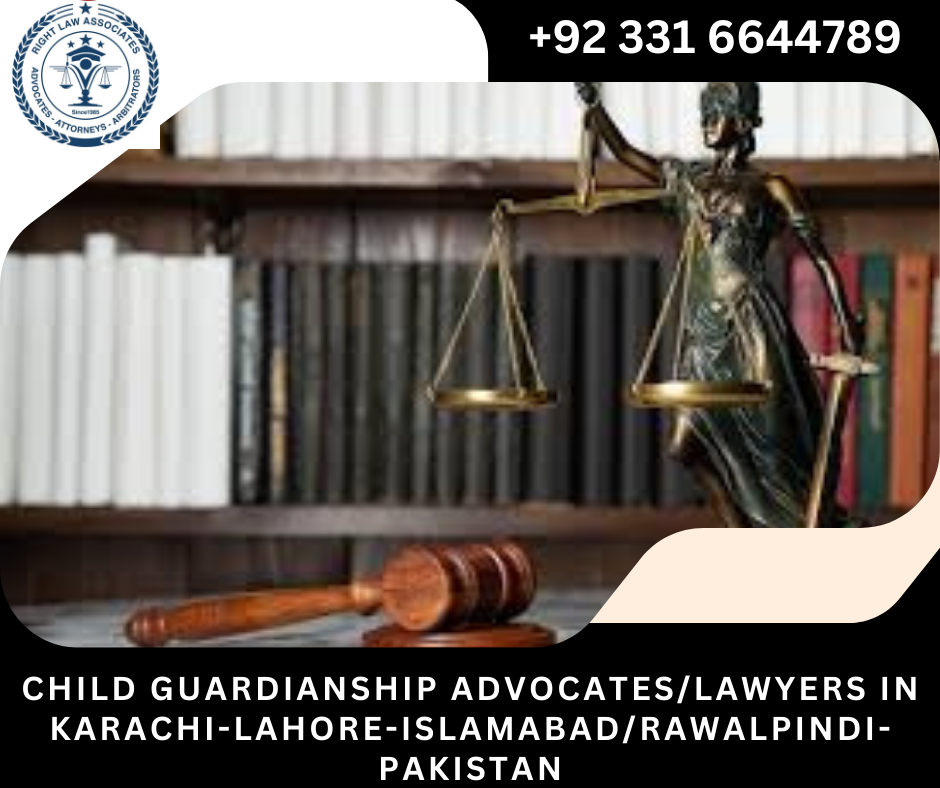
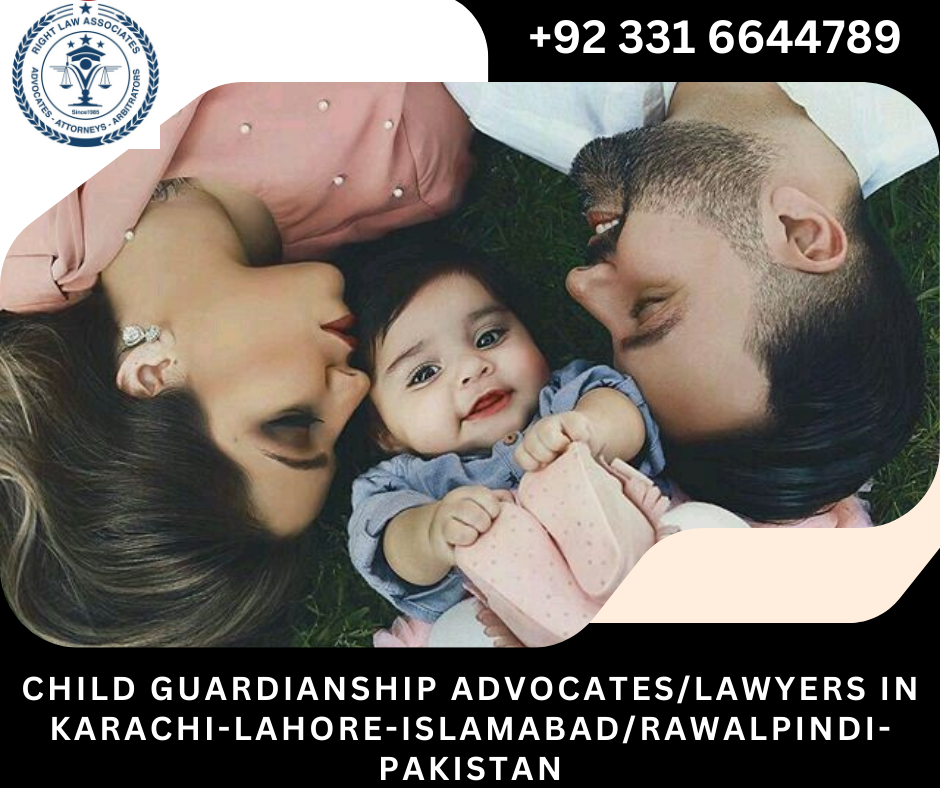
Challenges and Complexities in Guardianship
While guardianship is designed to ensure the child’s best interests, it comes with its own challenges and complexities. These may include:
Custody Disputes
Disputes between competing guardians or individuals seeking guardianship can arise, necessitating legal intervention.
Evolving Family Structures
Changes in family structures, such as remarriages or blended families, can introduce complexities in guardianship arrangements.
Cross-Border Considerations
International mobility and cross-border family scenarios may add layers of complexity to guardianship matters, requiring adherence to international conventions.
Legal Consultation and Expert Guidance
Navigating the intricate landscape of guardianship requires expert legal guidance. Consultation with a qualified family lawyer ensures a nuanced understanding of legal provisions, adherence to Islamic principles, and effective representation in legal proceedings.
Child Guardianship and Law
In conclusion, guardianship of a child is a multifaceted legal responsibility embedded in legal statutes and Islamic principles. The interplay between the Guardians and Wards Act of 1890 and Shariah compliance creates a robust framework that prioritizes the child’s best interests. Navigating the challenges and responsibilities of guardianship requires a keen understanding of legal nuances and a commitment to providing a nurturing environment for the child’s growth and development. Seeking legal consultation from experienced family lawyers is essential for individuals undertaking the responsibilities of guardianship, ensuring compliance with legal standards, and securing the welfare of the child.
This comprehensive exploration provides an in-depth understanding of guardianship, combining legal aspects, responsibilities, and considerations associated with this vital role in a child’s life.
SOME USEFUL LINKS:
Family Lawyers in Karachi, Islamabad & Lahore
Best Family Lawyers of Pakistan Legal Forum
Top Family Law Firm in Karachi
Best Divorce & Khula Lawyers in Karachi, Lahore, and Islamabad/Rawalpindi
Best Child Custody Lawyers
Top Child Custody Female Lawyer
Child Custody Expert Lawyer
Divorce & Child Custody Lawyers
Top Guardianship Advocates
Best Adoption Lawyers
Guardianship & Adoption Experts in Karachi
Child Adoption Lawyers of Qanoon Group, Pakistan
Best Lawyers For Family, Divorce & Khula Matters in Karachi
